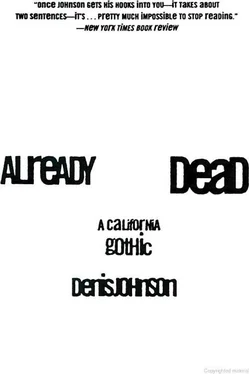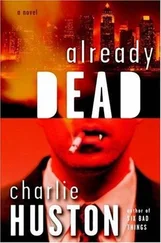The pigs hadn’t lived here way back then; they’re descended from escaped domestic animals. We toured the boundaries and ended up staring, I stared, anyway, at the muddy swatch torn out of the pondside grasses where two nights earlier I’d dragged him from the water. And at that moment he’d been dead. Here he’d been a corpse, now he walked past the same spot alive, gazing through from Already Dead / 91
another universe, or so I gathered he believed. But he hardly glanced at the spot. I told him I was going to name the pond Loch Ness. Did he think it was funny? I couldn’t tell.
“You said you’d pay me to kill her,” Van said.
“I don’t mean I’ll pay you. You have to go on and finish drowning — and do it in somebody else’s pond, please. But I’ll give ten grand to anybody you say.”
We sat on two oaken stumps side by side. Last year I’d sold most of the younger hardwood, a hundred thousand board feet, to a timber outfit. They’d chopped it all up and peddled it for firewood. I know — I know. But I’d been desperate for cash.
Sitting there on the stump, Van Ness put his hands on his knees and looked tired and confused. He wore mustaches like two horse’s tails, and round rimless glasses, very thick. These accessories nearly took away his face.
He said, “I want you to pay for Wilhelm Frankheimer’s rehab.”
“Rehab?”
“He’s a coke fiend. You know him?”
“I know him.”
“It’ll run you more than ten grand.”
“I’ll pay for his care.”
“Not until he wants it, though.”
Certainly I knew Frankheimer. In fact Frankheimer had done the plumbing for the house, and he’d also put the roof on top. I saw him once at a beautiful moment — watched him balance his hammer on a stack of cedar shingles one day, step carefully to the structure’s edge, and stand there two stories up in his giantism, loosing a glittering archway of piss down through the light. Evidently they were great buddies, Frankheimer and Van Ness, or had been once.
I took Van (as he liked to be called) back into the house because he did seem weary. Also I had something I wanted him to see. But I was nervous about it and so I began to hold forth and hog the whole show — it’s a terrible habit I have. I knew he’d like Nietzsche, if he hadn’t already heard of him, so I read to him from a book on Winona’s shelf.
It turned out he’d not only heard of the arrogant German, he could quote him endlessly and really get you squirming with boredom. I indulged him as long as I could stand it, after all he was my guest, and then I said, “I want to show you how I’ve arranged things.” I went up to the bathroom to get it while he sat in the living room 92 / Denis Johnson
on the couch. From the loft above he looked small and isolated. He did appear capable of almost any crime. He seemed possessed by a curious inactivity, settled there alone on the edge of the cushion, a tentativeness conveying complete disbelief in everything in sight. You can do anything, in a world you don’t believe in.
In a minute I sat down next to him on the couch and put a plastic bottle of capsules on the coffee table before us. “These are Winona’s Nembutal capsules,” I said. “Pretty potent.” From my pocket I produced another bottle.
“More Nembutal,” he said, reading the label on the second bottle.
“Why don’t you take one? One won’t hurt you.”
“I’d rather not.”
“What if I offered you a thousand dollars to take one?”
“I don’t think so.”
“Two thousand.”
“So these aren’t Nembutal.”
“You knew right away. You’re a natural-born plotter.”
“What’s in them?”
“Nembutal on the outside, horse dope on the inside. Zielene. Two of these will knock out a thousand-pound horse.”
“Will it kill her?”
“No. It’ll just put her out. Nothing will wake her. Tie a plastic bag around her head and go off for half an hour. Come back later and remove the evidence.”
He put his hands on his knees in that old-man way of his and scowled through his thick lenses and down over his dangling mustaches at the two little bottles there on the coffee table.
“I’d rather just smother her with a pillow.” The electrifying thing about all this was that each of us had come to the other out of nowhere. Nothing contradictory surrounded us, no evidence that we weren’t capable of anything — no familiar context full of obstacles, no deflating local histories. As a prophet gets laughed at in his hometown, so also the big-time conspirator. But a stranger could be God. If we kept on talking like this it would all actually come about.
“Then, afterward, you have to finish killing yourself,” I said.
“You won’t have to remind me.”
“If you have trouble going through with it, I’ll do it.”
“You’re too nice to me, Mr. Fairchild.”
Already Dead / 93
“I would have to, you see that. I couldn’t let you live. One way or another you’re sealing your fate. In a sense you’re dead as soon as you kill her.”
Van Ness pursed his lips, seemed to be kissing that thought as it hung in front of him. “That’s poetic.”
At the Wharton School in Monterey County, a prep school, one of the best (which I bored right through, though I hardly dented college), I read Hermann Hesse’s Demian and dreamed of a friendship like the one between Max Demian and Emil Sinclair, a bond that frees a person from other bonds and leads him into a new dimension.
From the little he told me I gathered that Van Ness had started out looking for that friend, too, and for that life worth staying on for, that religion, that woman, that vocation. The tall plumber, Frankheimer, may have served for a while in that regard. Once upon a time he’d accomplished a painful transit through a sort of incarnation where he’d been capable of friendship, arriving eventually at his present unapproachable state, this coked-up condition, everybody knew about it, that made him pitiful and dangerous both. And once upon a time Van had depended heavily on Frankheimer’s kinship, and on Demian as a guiding light, an affirmation and a model. But now he’d outgrown it in what he thought of as a cold and Nietzschean way. Outgrown all models, all reasons, outgrown life itself.
Now Van Ness claimed already to have died, more than once, in various other universes. Who can refute that? Is there any proof otherwise? Imagine a slight revision in Nietzsche’s myth of eternal return: not that at history’s end all matter collapses back to the center, Big-Bangs, and starts again identically; but that it starts again with one in-finitesimal difference in the action of a single molecule — every time, and an endless number of times. When you die, your consciousness blanks out, but it resumes eons later, when the history of molecules has been revised enough to preclude your death due to those particular circumstances: the bullet hits your brain in this world, but in a later one merely tickles your earlobe. You die in one universe and yet in another go on without a hitch. You don’t mark the intervening ages — subjectively you experience nothing other than almost having died. But in fact you’ve edged into another kingdom, ruled by another king, engaging other potentialities.
94 / Denis Johnson
If this were true, the person who understood it would have conquered death. Would be invulnerable. Would be the Superman.
There’s a dizzying thrill in a philosophy that can only be tested by suicide — and then never proven, only tested again by another attempt.
And the person embarked on that series of tests, treading that trail of lives as if from boulder to boulder across the river of time — no, out into the burning ocean of eternity — what a mutant! Some new genesis, like a pale, poisonous daisy.
Читать дальше












